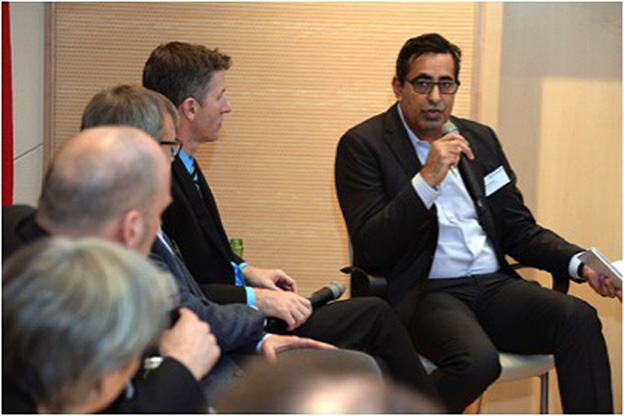Tipping point is near for improved teaching and learning

Arshad Ahmad, McMaster’s associate vice-president of teaching and learning, at a conference of international educators hosted by the Canadian embassy in Berlin.
Tangible progress towards better teaching is being made at McMaster, thanks to a revitalized commitment to embrace new teaching approaches fuelled by a growing partnership with students.
That was the key message of Arshad Ahmad, McMaster’s associate vice-president of teaching and learning, at a conference of international educators hosted by the Canadian embassy in Berlin. He said there is momentum for change in various parts of Canada. Institutions like McMaster are encouraging experimentation to scale evidence-based teaching practices. These are at a tipping point where many students stand to benefit.
Ahmad encouraged others to consider the McMaster experience, which has undergone significant changes that offer new directions for similar campus teaching and learning units worldwide.
“Not long ago, several leaders at my institution started painting a dream they had,” he said. “The dream was to establish an Institute that would take McMaster’s work and reputation in teaching and learning to the next level. On our canvas we would give new meaning to design, collaboration, scholarship and of course learning, in exciting new ways.”
The direct involvement of students is key, he said. At McMaster’s Institute for Innovation and Excellence in Teaching and Learning (MIIETL) “we are now formally engaging up to 50 undergraduate and graduate students in all aspects of our work. Their contribution as co-designers, co-producers and co-researchers are central to our success.”
Ahmad encourages educators to generate their own outcomes implicating new approaches to teaching to ensure these actually improving learning. He called on educators to consider their own contexts to improve teaching and learning. He emphasized the dramatic growth of grass-roots projects underway at McMaster, some of which is being led by cross-appointed faculty and participants of an extensive fellowship program. Pedagogical researchers are asking important questions that drive their teaching, their teaching with technology, their teaching with learning portfolio’s and so on. “We are enabling a new breed of scholars who are systematically producing evidence to improve practice that can be shared with colleagues” said Ahmad.
“Our emphasis on these areas is beginning to show tangible progress,” he said. “MIIETL is beginning to fulfill a role that I like to describe as a clearinghouse of ideas that generate evidence-based research with real potential to advance the practice of teaching and learning.”

